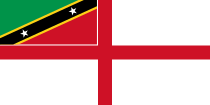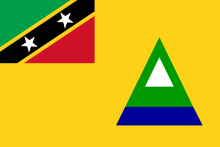Flag of Saint Kitts and Nevis
 | |
| Use | National flag, civil and state ensign |
|---|---|
| Proportion | 2:3 |
| Adopted | 19 September 1983 |
| Design | A yellow-edged black diagonal band bearing two white five-pointed stars divided diagonally from the lower hoist-side corner to the upper fly-side corner: the upper triangle is green and the lower triangle is red. |
| Designed by | Edrice Lewis |
| Naval ensign of Saint Kitts and Nevis | |
 | |
| Use | Naval ensign |
| Proportion | 1:2 |
| Design | A white field with a centered red cross, the national flag stretched out to a ratio of 1:2 is in the canton. |
| Flag of the governor-general of Saint Kitts and Nevis | |
 | |
| Proportion | 1:2 |
| Adopted | 19 September 1983 |
| Design | A lion statant guardant surmounted upon St Edward's Crown above a gold scroll inscribed with 'COUNTRY ABOVE SELF' on a blue field |


The national flag of Saint Kitts and Nevis consists of a yellow-edged black band containing two white stars that divides diagonally from the lower hoist-side corner, with a green upper triangle and red lower triangle. Adopted in 1983 to replace the flag of Saint Christopher-Nevis-Anguilla, it has been the flag of the Federation of Saint Kitts and Nevis since the country gained independence that year. Although the flag utilises the colours of the Pan-Africanist movement, the symbolism behind them is interpreted differently.[1]
The islands of Anguilla, Nevis, and Saint Christopher formed a province of the West Indies Federation in 1958. After the federation dissolved four years later, they were granted the status of associate state as Saint Christopher-Nevis-Anguilla.[2] However, Anguilla decided to secede from the federation in 1969,[3] owing to fears that their population, which was already small, would be further marginalised in parliament.[2] This was eventually formalised in 1980,[3] and a new flag for the remaining parts of the federation was needed, since the symbolism of the previous flag centred on the concept of a union of three.[2]
A national competition was held in the early 1980s to choose a new flag. The winning design by student Edrice Lewis was one of 258 entries.[4] It was first hoisted one minute after midnight on 19 September 1983, the day Saint Kitts and Nevis became an independent country.[5][6]
Design
[edit]Symbolism
[edit]While the flag's design greatly resembles that of Tanzania, its colours and symbols carry cultural, political, and regional meanings. The green alludes to the country's fertile land, while the red evokes the fight against slavery and colonialism. The yellow stripes represent the sunshine the islands enjoy all year round, and the black epitomises the people's African origins.[2][4] The two stars on the black band symbolise the two islands as well as hope and liberty.[2][4][7] The official meaning behind the flag's symbols was formulated by Edrice Lewis, the same person who designed the flag.[4]
Historical flags
[edit]| Flag | Duration | Use | Description |
|---|---|---|---|
 |
1871–1952 | Flag of the British Leeward Islands | |
 |
1952–1958 | Flag of the British Leeward Islands | |
 |
1958–1962 | Flag of the West Indies Federation | A blue field with four white horizontal wavy bars (the top pair of bars being parallel and the lower pair also parallel) and an orange sun in the centre. |
 |
1958–1967 | Flag of Saint Christopher-Nevis-Anguilla | |
 |
1967 | Flag of Saint Christopher-Nevis-Anguilla | A vertical tricolour of green, yellow and blue. |
 |
1967–1983 | Flag of Saint Christopher-Nevis-Anguilla | A vertical tricolour of green, yellow and blue charged with a palm tree at the centre. |
Flag of Nevis
[edit]
The flag of Nevis island incorporates the flag of the Federation of Saint Kitts and Nevis in the top left corner.
The golden field stands for sunshine. The central triangle represents the conical shape of Nevis, with the blue being the ocean; the green being the verdant slopes of the island; and the white being the clouds that usually wreathe Nevis Peak.
References
[edit]- ^ Shaw, Carol P. (1992). Flags. HarperCollins UK. ISBN 0-00-470114-3.
- ^ a b c d e Smith, Whitney. "Saint Kitts and Nevis, flag of". Encyclopædia Britannica. Encyclopædia Britannica, Inc. Archived from the original on 4 December 2013. Retrieved 10 June 2013.(subscription required)
- ^ a b Olson, James Stuart; Shadle, Robert, eds. (1 January 1991). Historical Dictionary of European Imperialism. Greenwood Publishing Group. p. 28. ISBN 9780313262579. Retrieved 10 June 2013.
- ^ a b c d Kindersley, Dorling (3 November 2008). Complete Flags of the World. Dorling Kindersley Ltd. p. 33. ISBN 9781405333023. Retrieved 10 June 2013.
- ^ Hagman, Harvey (20 September 1983). "Newest Caribbean Flag Is Raised Over Tiny State Of St. Kitts–Nevis". The Miami Herald. Associated Press. p. 18A. Archived from the original on 5 March 2016. Retrieved 10 June 2013.(subscription required)
- ^ Sewell, Dan (19 September 1983). "St. Kitts–Nevis: New nation born". The Free Lance-Star. Fredericksburg. Associated Press. p. 4. Archived from the original on 6 December 2021. Retrieved 10 June 2013.
- ^ "Saint Kitts and Nevis". The World Factbook. CIA. Archived from the original on 5 December 2020. Retrieved 10 June 2013.
